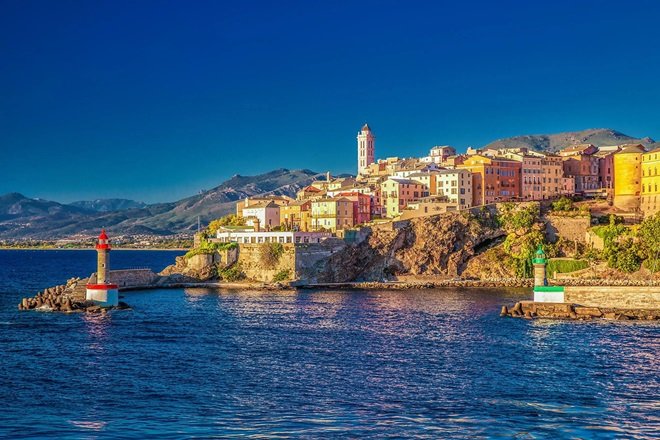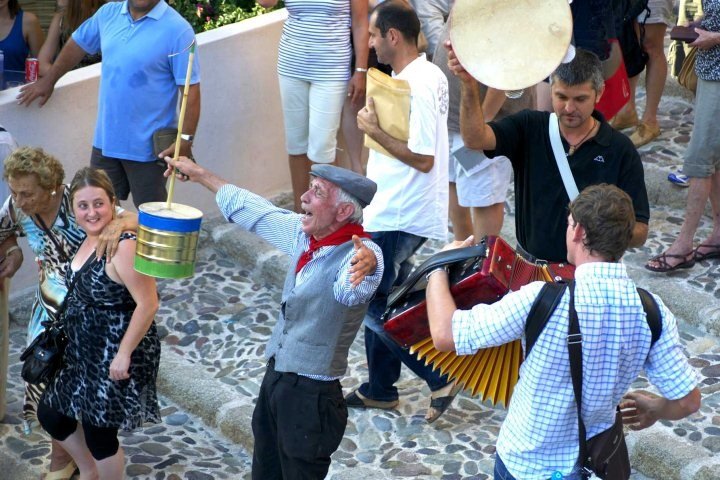Introduction to Corsica
Nestled in the Mediterranean Sea, Corsica is a captivating island known for its rugged beauty, rich history, and vibrant culture. Often referred to as “The Isle of Beauty,” Corsica offers a unique blend of French and Italian influences, creating a distinct identity that sets it apart from other Mediterranean destinations.
The Mystical Island of the Mediterranean
Corsica’s nickname, “The Isle of Beauty,” is well-deserved. This island, with its dramatic landscapes, crystal-clear waters, and picturesque villages, feels like a place where nature and history come together in perfect harmony. The island’s charm lies in its diversity from the towering granite peaks of the interior to the stunning sandy beaches that fringe the coastline. Every corner of Corsica tells a story, whether it’s through its ancient ruins, medieval towns, or the wild, untamed beauty of its nature reserves.
A Brief History of Corsica
Corsica’s history is as rich and varied as its landscape. Over the centuries, the island has been shaped by numerous civilizations, each leaving its mark on the culture and architecture.
Ancient Times to Modern Day
The history of Corsica dates back to prehistoric times, with evidence of human habitation as early as 6,000 B.C. The island was first settled by ancient tribes, followed by the Greeks, who established colonies in the 6th century B.C. The island’s strategic location in the Mediterranean attracted the interest of major powers, leading to centuries of conquest and rule by the Carthaginians, Romans, Vandals, Byzantines, and Lombards.
In the Middle Ages, Corsica became a battleground for control between the Republics of Pisa and Genoa. The Genoese ultimately gained control in the 13th century and ruled the island for nearly 500 years, leaving a lasting impact on Corsican culture, language, and architecture.
Corsica’s Influence on European History
Corsica’s most famous historical figure is Napoleon Bonaparte, born in Ajaccio in 1769. His rise to power in France brought the island into the spotlight and forever tied its identity to French history. Despite its connection to France, Corsica has maintained a strong sense of autonomy and cultural pride. The island has been part of France since 1768, but its unique traditions and language, Corsican, which is closely related to Italian, are still very much alive.
Geography and Climate of Corsica

The Diverse Landscape
Corsica’s landscape is incredibly diverse, offering a stunning variety of natural environments. The island is often described as a “mountain in the sea,” with over two-thirds of its area consisting of mountains.
Mountains and Forests
The interior of Corsica is dominated by the rugged peaks of the Corsican Mountains, with Monte Cinto being the highest at 2,706 meters (8,878 feet). These mountains are covered with dense forests, including the famous laricio pines, which are native to the island. The forests are home to a rich variety of wildlife, including wild boars, mouflons (a type of wild sheep), and the Corsican nuthatch, a bird species found nowhere else in the world.
Beaches and Coastal Areas
In contrast to its mountainous interior, Corsica boasts some of the most beautiful beaches in the Mediterranean. The island’s coastline stretches for over 1,000 kilometers (620 miles) and is dotted with sandy shores, hidden coves, and dramatic cliffs. The beaches of Palombaggia, Santa Giulia, and Rondinara in the south are particularly famous for their turquoise waters and fine white sand.
The Mediterranean Climate
Corsica enjoys a typical Mediterranean climate, characterized by hot, dry summers and mild, wet winters. However, the island’s diverse geography means that the climate can vary significantly depending on the region.
Seasonal Variations
In the coastal areas, summer temperatures often reach the mid-30s Celsius (95°F), making it a perfect time for beach activities. The mountainous regions, however, remain cooler, offering a refreshing escape from the heat. Winters are mild along the coast, but the mountains can see significant snowfall, turning Corsica into a winter wonderland.
Best Time to Visit
The best time to visit Corsica depends on what you’re looking to experience. For beach lovers, the summer months of June to September are ideal. If you prefer hiking and exploring the mountains, spring (April to June) and autumn (September to October) offer pleasant weather and fewer crowds. Winter is perfect for those interested in skiing or enjoying a quiet retreat in the mountains.
Culture and Traditions

Corsica’s culture is a unique blend of French and Italian influences, with a strong sense of local identity that is evident in its language, music, cuisine, and traditions.
The Unique Corsican Identity
The people of Corsica are fiercely proud of their heritage, and this pride is reflected in their customs, language, and way of life. While Corsica is officially part of France, many Corsicans see themselves as Corsicans first and French second.
Language and Dialects
Corsican (Corsu) is the traditional language of the island, and although French is the official language, Corsican is still spoken by many, particularly in rural areas. The language is closely related to Italian, specifically the Tuscan dialect, and efforts are being made to preserve it through education and cultural initiatives.
Music and Dance
Music plays a central role in Corsican culture, with traditional polyphonic singing (Paghjella) being one of the most distinctive features. These haunting, multi-part harmonies are often performed a cappella and are a powerful expression of the island’s spiritual and cultural life. Traditional dances, such as the “mazzeru” and “moresca,” are also an important part of Corsican celebrations and festivals.
Traditional Corsican Cuisine
Corsican cuisine is a reflection of the island’s rural and coastal heritage, combining the flavors of the Mediterranean with the robust tastes of the mountains.
Local Ingredients and Specialties
The island’s cuisine is centered around local ingredients, including chestnuts, wild boar, lamb, and a variety of herbs like rosemary and thyme. One of the most famous Corsican products is figatellu, a type of smoked pork sausage flavored with garlic and spices. Another specialty is brocciu, a fresh cheese made from ewe’s or goat’s milk, often used in both savory and sweet dishes.
Corsican Wines and Spirits
Corsica has a long tradition of winemaking, with vineyards producing a range of excellent wines, particularly red and rosé varieties. The island’s wines are known for their full-bodied flavors, influenced by the unique terroir of Corsica’s hillsides and coastal plains. Additionally, myrtle liqueur (Myrte) is a popular Corsican spirit made from the berries of the myrtle plant, offering a taste of the island’s wild landscape.
Conclusion
Corsica is a place of breathtaking beauty and deep cultural richness. From its rugged mountains and pristine beaches to its vibrant traditions and cuisine, the island offers an unforgettable experience for travelers seeking both adventure and relaxation. Whether you’re exploring the ancient towns, hiking through the forests, or simply enjoying a glass of local wine by the sea, Corsica invites you to immerse yourself in its unique and enchanting world.
FAQs
1. What is Corsica best known for?
Corsica is best known for its stunning natural landscapes, including its mountains, forests, and beautiful beaches. It is also famous for its unique culture, cuisine, and as the birthplace of Napoleon Bonaparte.
2. Is Corsica part of France or Italy?
Corsica is part of France, although it has a distinct culture and language that are heavily influenced by Italian heritage.
3. What is the best time to visit Corsica?
The best time to visit Corsica depends on your interests. Summer is ideal for beachgoers, while spring and autumn are perfect for hiking and exploring the island’s natural beauty.
4. What language is spoken in Corsica?
While French is the official language, many locals also speak Corsican (Corsu), a language closely related to Italian.
5. How can I experience Corsican culture?
To experience Corsican culture, visit local festivals, listen to traditional music, try the island’s cuisine, and explore its historic towns and villages.